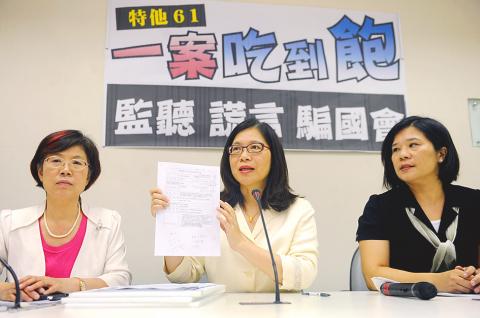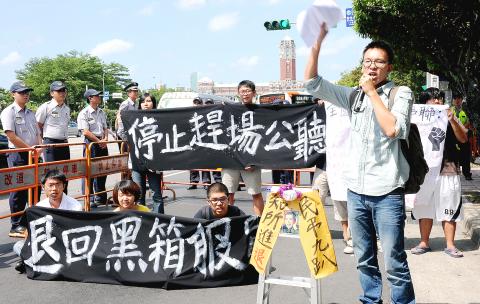The Democratic Progressive Party (DPP) yesterday held a press conference showing how the Special Investigation Division (SID) wiretapped the party’s caucus whip Ker Chien-ming (柯建銘), and also revealed that it had inadvertently wiretapped the daughter and husband of High Prosecutors’ Office Prosecutor Lin Shiow-tao (林秀濤).
Party legislators unanimously blasted the division for overreach and acting above and beyond the parameters of its given powers.
On Aug. 31 SID Prosecutor-General Huang Shih-ming (黃世銘) informed President Ma Ying-jeou (馬英九) of alleged lobbying involving Chinese Nationalist Party (KMT) Wang Jin-pyng (王金平), Ker, former minister of justice Tseng Yung-fu (曾勇夫), High Prosecutors’ Office Head Prosecutor Chen Shou-huang (陳守煌) and Lin.

Photo: Taipei Times
During the wiretapping of Lin, the division found that the telephone they believed to be Lin’s was actually used by her daughter, and had quickly terminated the wiretapping before applying for another wiretap approval for the telephone Lin was using, the division said on Wednesday.
The SID said that the telephone used by Lin’s daughter was tapped for less than a week.
Huang’s admission on Wednesday that the division had tapped Lin’s telephone sparked heated debate among legal experts and also drew fire from DPP Chairman Su Tseng-chang (蘇貞昌).

Photo: Liu Hsin-de, Taipei Times
That a junior-high school student was placed under wiretap and surveillance is a great setback to the democratic values Taiwan holds dear, Su said, adding that Huang should step down as prosecutor-general and be investigated.
Su called on Ma to take responsibility and explain the situation.
DPP legislators also lambasted the division, with Kuan Bi-ling (管碧玲) saying that no one really knew how many wiretaps had been carried out, adding that the lack of knowledge was terrifying.
Kuan said that all her data had been provided by the division, and that the documents received on Sept. 17 had showed a total of only 28 wiretap approvals, six of which were related to Ker’s case. She added that after Huang’s admission on Wednesday that the division had also wiretapped Lin, two new cases were revealed.
Kuan also pointed to the four wiretap approvals that were to be sent to Ker provided by Huang and said they were only vaguely connected to Ker.
The approvals had been used to wiretap former KMT Tainan City councilor Wu Chien-pao (吳健保), Ker, Lin’s husband, and Wu’s lawyer Tu Ying-ta (杜英達). Wu was jailed for profiteering in 2006.
Aside from being accused of lobbying Wang to influence Tseng, Chen, and Lin to relieve legal pressure from himself, Ker was sentenced to six months in jail for violating the Business Accounting Act (商業會計法) in 1997 when he was general manager of Formosa Telecom Investment Co (全民電通). The court allowed the sentence to be commuted to a fine. The ruling was appealed twice. A retrial at the Taiwan High Court found Ker not guilty.
Kuan said the latest evidence indicated that Ker’s wiretap had been approved because he was potentially involved in the bailing of Wu. This was tied to a bribery case in 2010 in which Taiwan High Court judges Chen Jun-ho (陳榮和), Lee Chun-ta (李春他), Tsai Kuang-chih (蔡光志), and Banciao District Prosecutor Office prosecutor Chiu Mao-jung (邱茂榮) had taken bribes to rule former KMT Legislator Ho Chih-hui (何智輝) not guilty in a graft case.
Kuan lambasted that the division had been using the 2011 SID case No. 61 (一百年特他字第六十一號), which had been filed to wiretap all possible suspects in the judges bribery case in 2010, as a ploy to use the judiciary system’s shame that its members had been embroiled in bribery cases to ask for wiretap warrants, adding a call for the division to provide the data for every case that had been wiretapped by warrants applied for under No. 61.
DPP Legislator You Meinu (尤美女) also said that only cases that merited at least three years of imprisonment as a sentence, but the intentions for committing the crime and evidence linking the crime and the perpetrator could not be found outside of wiretapping could apply for wiretaps.
The four wiretap approval notices provided by Huang showed that lobbying itself was not an element necessitating wiretapping, You said.
DPP Legislator Wu Yi-chen (吳宜臻) also called for the division to bring out all the evidence, while Yao Pasuya (姚文智) also called for Huang to step down.
Additional reporting by Lee Hsin-fang.

Tropical Storm Gaemi strengthened into a typhoon at 2pm yesterday, and could make landfall in Yilan County tomorrow, the Central Weather Administration (CWA) said yesterday. The agency was scheduled to issue a sea warning at 11:30pm yesterday, and could issue a land warning later today. Gaemi was moving north-northwest at 4kph, carrying maximum sustained winds near its center of up to 118.8kph and gusts of 154.8kph. The circumference is forecast to reach eastern Taiwan tomorrow morning, with the center making landfall in Yilan County later that night before departing from the north coast, CWA weather forecaster Kuan Shin-ping (官欣平) said yesterday. Uncertainty remains and

SEA WARNING LIKELY: The storm, named Gaemi, could become a moderate typhoon on Wednesday or Thursday, with the Taipei City Government preparing for flooding A tropical depression east of the Philippines developed into a tropical storm named Gaemi at 2pm yesterday, and was moving toward eastern Taiwan, the Central Weather Administration (CWA) said. Gaemi could begin to affect Taiwan proper on Tuesday, lasting until Friday, and could develop into a moderate typhoon on Wednesday or Thursday, it said. A sea warning for Gaemi could be issued as early as Tuesday morning, it added. Gaemi, the third tropical storm in the Pacific Ocean this typhoon season, is projected to begin moving northwest today, and be closest to Taiwan on Wednesday or Thursday, the agency said. Today, there would likely

DISRUPTIONS: The high-speed rail is to operate as normal, while several airlines either canceled flights or announced early departures or late arrivals Schools and offices in 15 cities and counties are to be closed today due to Typhoon Gaemi, local governments announced last night. The 15 are: Taipei, New Taipei City, Taoyuan, Tainan, Keelung, Hsinchu and Kaohsiung, as well as Yilan, Hualien, Hsinchu, Miaoli, Chiayi, Pingtung, Penghu and Lienchiang counties. People should brace for torrential rainfall brought by the storm, with its center forecast to make landfall on the east coast between tonight and tomorrow morning, the Central Weather Administration (CWA) said. The agency issued a sea warning for the typhoon at 11:30pm on Monday, followed by a land warning at 11:30am yesterday. As of

CASUALTY: A 70-year-old woman was killed by a falling tree in Kaohsiung as the premier warned all government agencies to remain on high alert for the next 24 hours Schools and offices nationwide are to be closed for a second day today as Typhoon Gaemi crosses over the nation, bringing torrential rain and whipping winds. Gaemi was forecast to make landfall late last night. From Tuesday night, its outer band brought substantial rainfall and strong winds to the nation. As of 6:15pm last night, the typhoon’s center was 20km southeast of Hualien County, Central Weather Administration (CWA) data showed. It was moving at 19kph and had a radius of 250km. As of 3pm yesterday, one woman had died, while 58 people were injured, the Central Emergency Operation Center said. The 70-year-old